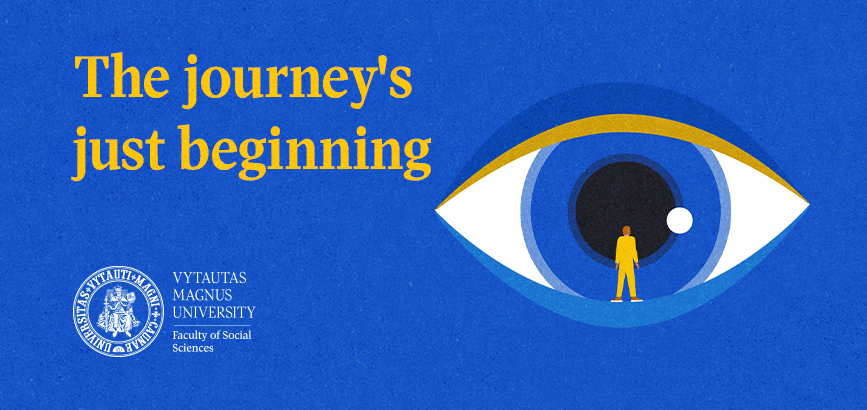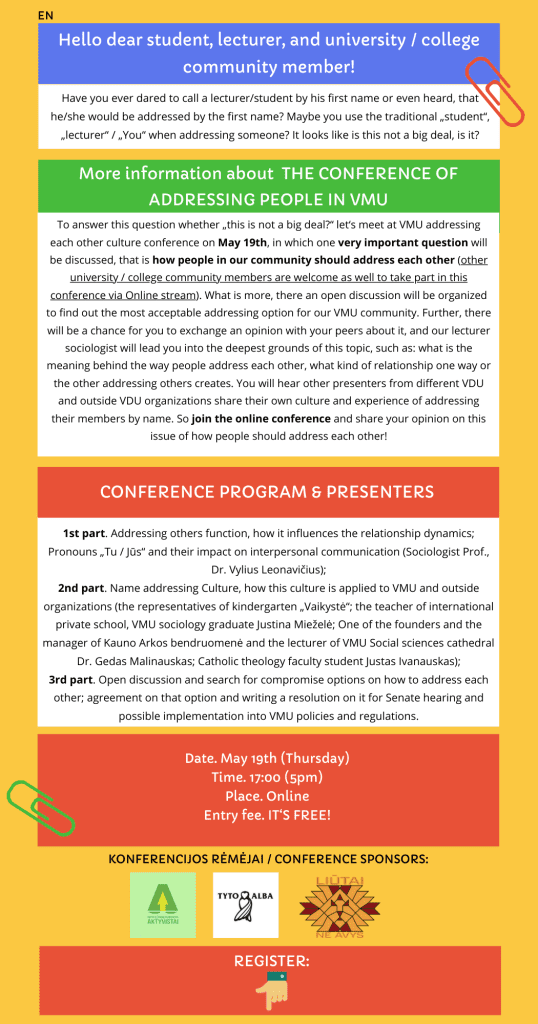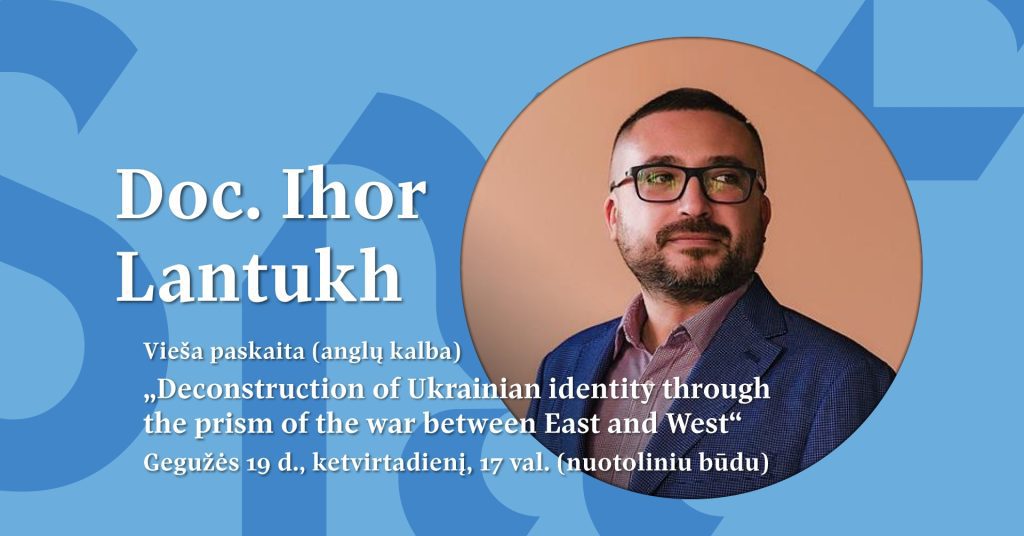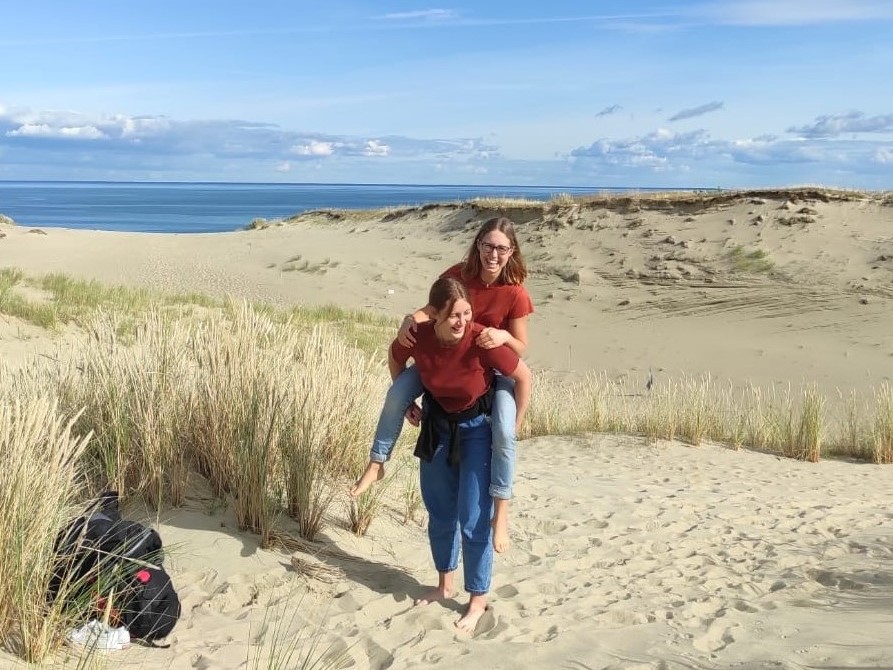The conference of addressing people in VMU
Public lecture „Deconstruction of Ukrainian identity through the prism of the war between East and West”
Vytautas Magnus University Department of Sociology would like to invite you to a public lecture given by doc. dr. Ihor Lantukh from V. N. Karazin Kharkiv National University (Ukraine). The title of the lecture: „Deconstruction of Ukrainian identity through the prism of the war between East and West”.
The lecture will be held on the 19th of May at 5 p.m. (online).
Annotation of lecture
Throughout the history of the Russian Federation «Empire, Union», Moscow has pursued a policy toward Ukraine predicated on the assumption that respective national identities are artificial—and therefore fragile. Nonetheless, Russia’s war has become bogged down in no small part because this calculation about Ukrainian identity has proven dramatically wrong. The war created a new reality in the Ukraine by strengthening the sense of political unity and state identity. It mobilized the population, including Ukrainian Russian speakers, on the government’s side. Russia’s further invasion of Ukraine triggered mass ethnic defection that united the population and boosted their sense of civic belonging. The war with Russia increased the notion of Ukrainian citizenship as opposed to ethnic Ukrainian. The Russian-speaking minority reconsidered not only their sense of national identity but also their stance toward the Ukrainian language. Many individuals started to identify themselves with the Ukrainian language even without knowing it while perceiving it as the symbolic marker of the country.
About the lecturer
In 1997 he graduated from Kharkiv State University with a degree in History and Finance and Credit, Kramatorsk Institute of Economics and Humanities with a degree in Psychology, Kharkiv Institute of IAPM with a degree in Medical Psychology.
In 2001 he defended his thesis and received the scientific degree of candidate of economic sciences. In 2006 he was awarded the title of associate professor of economic theory. In 2020 he defended his dissertation and received a doctorate in psychology.
Author of more than 140 publications, including 35 articles in professional publications, 7 in foreign publications, 6 monographs, 8 textbooks.
Moderator: Head of the Department of Sociology doc. dr. Jurga Bučaitė-Vilkė.
To join the event, press this link: https://bit.ly/3MYPTqX
Erasmus+ students from Germany Laura Böttcher and Anne Kleinert
You have spent a semester as an Erasmus+ exchange student at the Faculty of Social Sciences at VMU. Why did you choose our university?
VMU is a partner university of the PH Heidelberg, so we found it on the list of potential ERASMUS opportunities. As we both didn´t know a lot about the country, it´s language or its culture, studying in Lithuania was a very interesting experience for us.
How would you generally describe your Erasmus+ experience and your experience at VMU?
We spent one semester in Lithuania with the ERASMUS+ programme. This programme provides a lot of support when it comes to planning and executing the stay (we had mentors in Germany and in Lithuania who we could always ask when problems occurred). When you want to study in another European country for one semester, ERASMUS+ is a great idea as you not only get organizational but also financial support.
In general, VMU appeared as a very modern and futuristic university to Anne. We were very impressed by their social media appearance (Instagram page of VMU with really good photos). The courses were very international as the offer of English courses was quite big. The people we got to meet there were also really nice and became really good friends. We also appreciated that the teachers were always replying so fast to e- mails and that they were very flexible (for example when we had to switch the exam to online very spontaneously because we were in contact with a friend who got the Covid-19).
What did you like the most during your studies at VMU?
We really enjoyed that the courses in general (field of social sciences) had so much focus on discussion. The input of the courses was very interesting.
Which useful competencies do you think you acquired during your Erasmus+ exchange period?
We got to improve our English and Lithuanian. We improved our competences in creative works (creating an Instagram profile, inventing myths, etc.), how to write essays and hold presentations in English. We got more open-minded and learned a lot about history, geography and culture, not only about Lithuania, but also about other parts of the world.
Would you recommend VMU for other students who want to study abroad? Why?
We would definitely recommend VMU for this experience. This is a great chance to learn about history, another culture and yourself.
What are your career plans for the future?
We are studying special education, so we are hoping to work with blind/ deaf people one day.
Interview conducted by Laura Lapinskė, International relations coordinator of the Faculty of Social Sciences at VMU
















